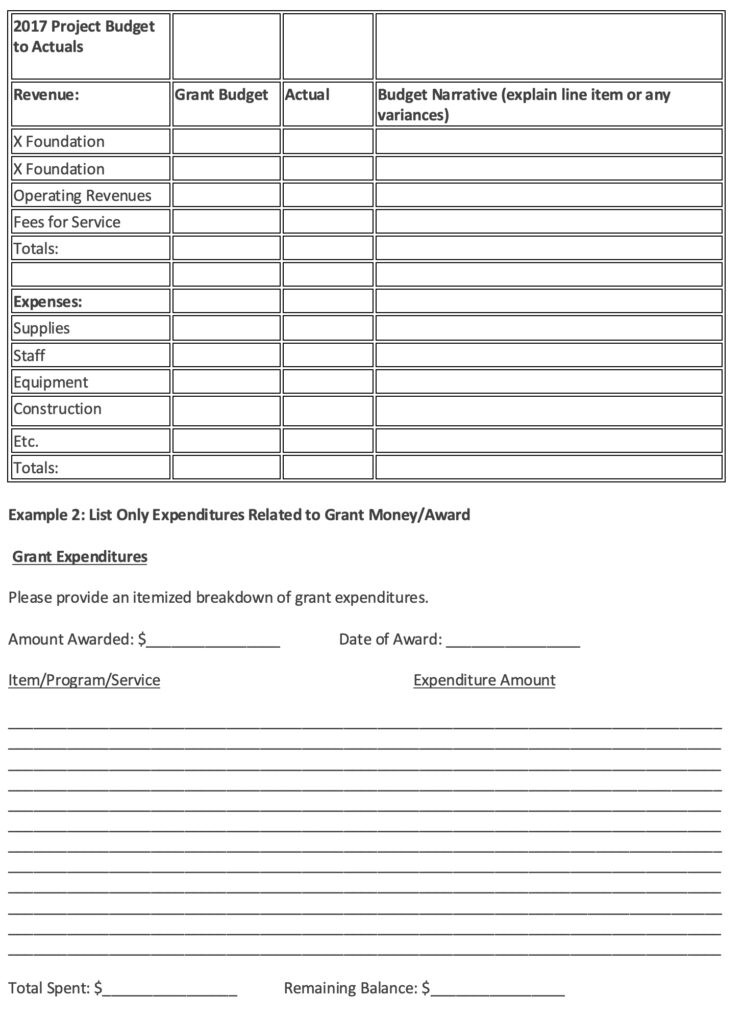08 Feb Successful Grant Reporting: What About When You’re Left Without a Format by Hayley Waynick, GPC
Successful Grant Reporting
What about when you’re left without a format!?
Grant writers tend to be rule followers. We crave structure and details. We’re all about formats, deadlines, and word counts (well sometimes). But what should you do when a funder wants a report but doesn’t provide you with any instructions? The possibilities can seem endless…Should it be short or long? What should I include? Do they want a financial report…outcomes?
Having a “general grant report format” in your arsenal can be a useful tool when you encounter this situation. Even though the funder may not require you to follow a stringent set of instructions, it’s important that you tell the story of your grant in a succinct, yet detailed manner.
Timing may also be an issue. If you are unsure about when to send the funder a report, first be sure you review their guidelines. If they don’t provide a specific due date, then a general rule of thumb is setting a deadline one year from the time of the grant award. However, if your project is something that has a distinct beginning and end, you may consider reporting to them earlier-anywhere from 30-90 days after project completion. Often, if the grant is for a specific ongoing program, such as funding direct services of an outreach program for homeless youth, you can set a goal to report out by the end of the year, even if the grant was awarded in April. Always assess reporting deadlines on a case by case basis, and don’t be afraid to just pick up the phone and call the program officer!
I recommend a report without any guidelines be no more than two to three pages long, plus a one-page financial report and one-page cover letter. Again, this is not a hard and fast rule-it depends on the grant and the funder.
As the due date approaches, use the following list of critical components to guide you in drafting a quality grant report:
Agency Update
Provide a brief update on your agency during the grant period: major accomplishments, number served, activities engaged, and new partnerships.
Staff
Who is/was responsible for carrying out this project? What role did they play?
Target Population Served
Who are/were the beneficiaries of this project? Include the number of clients served. This is a great place to insert a story!
Program/Project Update
Give an overview of what your program/project accomplished within the grant period; include a timeline, milestones, major changes, as well as strategies and activities you implemented.
Discuss important discoveries or lessons you learned as you implemented the project (i.e. internal and external supports and challenges, barriers to progress, and any unanticipated outcomes or impact), and how you have incorporated new knowledge into project operations.
Progress Towards Goals and Outcomes
Copy and paste your goals, objectives, and outcomes from the proposal and provide final results for each (use the grant period as your guideline). Be sure to express how you fulfilled the goals set by your organization in the grant application.
Future Plans
Discuss where the project/program will go from here; what are the next steps?
Additional Documents to Attach:
-
-
- Cover Letter
When appropriate, create a cover letter addressed to the proper contact/program officer; thank the funder, reiterate what they funded, give a very brief overview of what their funds allowed you to do, and let them know what is enclosed (a report outlining an update of the project/program). - Media attachments
If relevant attach any stories, photos, social media posts, media clippings, or anything else that might highlight the success of the program/project. - Budget to Actuals/Financial Report
Provide the funder with a one-page attachment that clearly states: 1) you’ve spent the money the way you proposed and 2) you’ve fully spent all their funds. - Example 1: Budget to Actuals Report on Revenues and Expenditures
This is good for grants in which the funder underwrote expenses of an entire project (if they funded a very specific part of the project, you should note that in the narrative). You could also omit the revenue portion and only list expenses in the table. If revenue is left out, provide a comprehensive list of “other funders” below.
- Cover Letter
-
GPC Competency 5: Knowledge of post-award grant management practices sufficient to inform effective grant design and development. Skill 4: Identify methods of establishing transitions to post-award implementation that fulfill project applications (e.g., document transfer, accuracy, in post-award fiscal and activity reporting).

